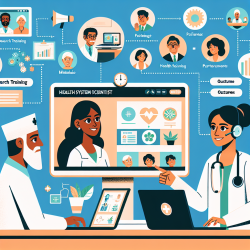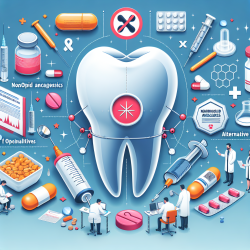The concept of Learning Health Systems (LHS) is revolutionizing the way healthcare is delivered and improved. By integrating science, informatics, incentives, stakeholders, and culture, LHS promotes continuous improvement and innovation. As a practitioner in the field of online therapy services, such as those provided by TinyEYE, it's crucial to understand how to leverage the findings from recent research to enhance your skills and contribute to better health outcomes.
The Significance of Learning Health Systems
LHS aligns various components of healthcare to create a system that learns and evolves over time. This approach not only benefits patients but also enhances the skills of healthcare practitioners by providing them with opportunities to engage in meaningful research and apply evidence-based practices.
Key Outcomes from Recent Research
The research article "Training the Next Generation of Learning Health System Scientists" by Lozano et al. outlines several key outcomes that can be implemented by practitioners:
- Partnership Building: Developing strong partnerships between scholars and health system leaders is essential. These partnerships facilitate the exchange of knowledge and provide opportunities for practitioners to engage in embedded research.
- Mentored Research Training: Participating in mentored research training programs allows practitioners to gain hands-on experience in conducting research within health systems. This training helps in understanding patient needs and translating research findings into practice.
- Diverse Scholar Recruitment: Engaging scholars from various clinical and non-clinical backgrounds enriches the learning environment and fosters innovative solutions to healthcare challenges.
Implementing Research Outcomes in Practice
As a practitioner, incorporating the outcomes of this research into your practice can significantly enhance your skills and impact on patient care:
- Cultivate Partnerships: Actively seek collaborations with health system leaders and other professionals. This can be achieved through networking events, conferences, or collaborative projects.
- Pursue Further Education: Consider enrolling in programs or workshops that offer mentored research training. These programs provide valuable insights into conducting effective research within health systems.
- Diversify Your Skill Set: Engage with scholars from different disciplines to broaden your understanding of healthcare challenges and solutions. This diversity can lead to innovative approaches in your practice.
The Role of Online Therapy Services
TinyEYE's online therapy services play a crucial role in the evolving landscape of healthcare delivery. By integrating LHS principles, online therapy can become more effective and responsive to patient needs. Practitioners can utilize data-driven insights to tailor therapy sessions, ensuring that they meet the specific requirements of each student.
The Future of Learning Health Systems
The future of LHS lies in its sustainability and the continued support for scholar activities. Practitioners must advocate for organizational backing to ensure that LHS initiatives are maintained and expanded. By doing so, they contribute to a healthcare system that continuously learns and adapts to new challenges.
The journey towards becoming a proficient practitioner within an LHS framework requires dedication to learning and collaboration. By implementing the outcomes from recent research, practitioners can enhance their skills, improve patient outcomes, and drive transformational change within health systems.
Training the next generation of learning health system scientists










